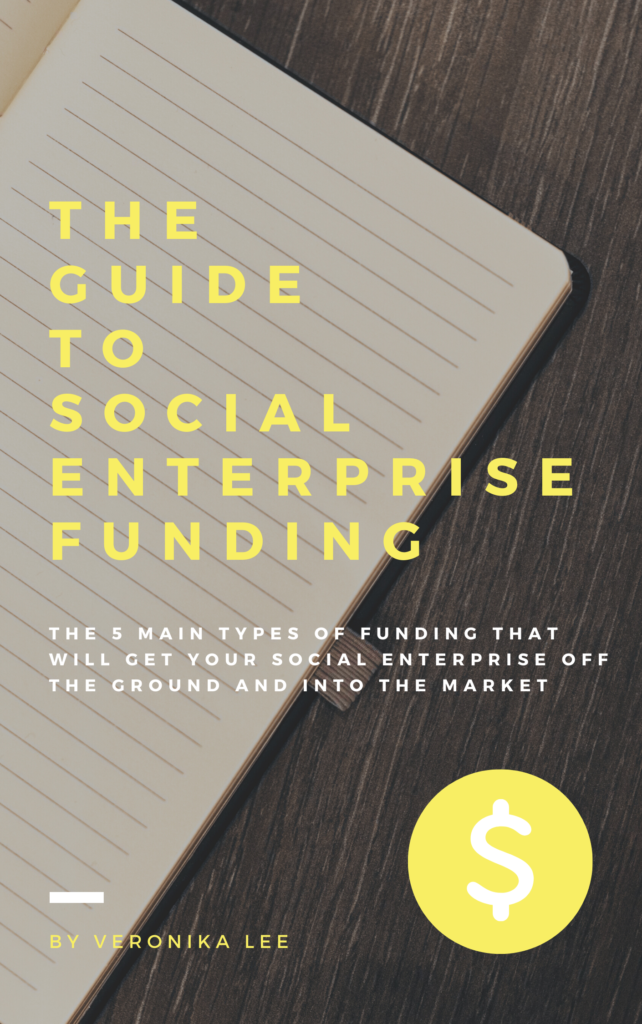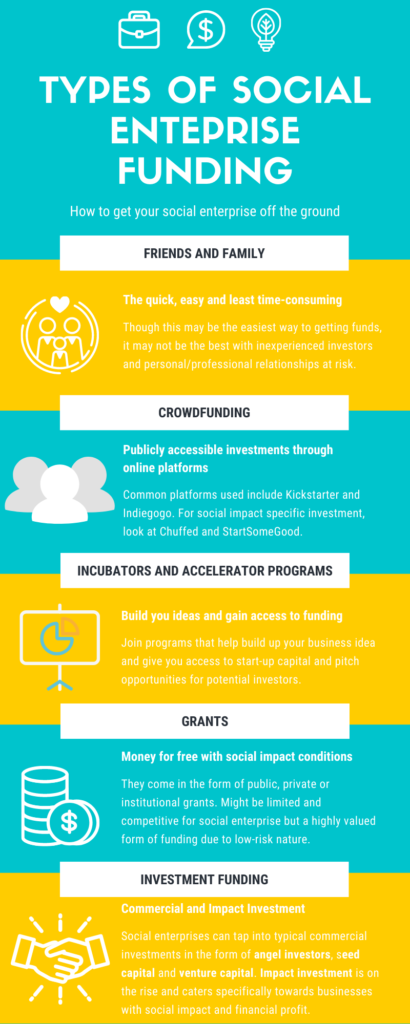
You’ve caught the buzz of social entrepreneurship, had a look at our guide to social entrepreneurship and are ready to get your world-changing business off the ground.
Now you’ve reached one of the hardest challenges faced by social entrepreneurs – funding.
Though your idea may be ground-breaking, many traditional investors are still on the fence with social enterprises and still see social impact as a financial risk rather than a worthwhile investment.
To add onto your problems, social enterprises are often barred from typical grants only offered to NGOs, charities and other organizations due to their for-profit nature.
But it’s not the end of the world! There are plenty of other funding opportunities and as social entrepreneurship becomes more popular, these options are bound to grow.
From friends and family to angel investors and grants, we’ve put together a list of the different types of funding available and how to access them.
Types of Social Enterprise Funding
Social enterprise funding options include..
- Friends and Family
- Crowdfunding
- Incubators and Accelerator Programs
- Grants
- Investment Funding

1. Social Enterprise Funding from Friends and Family
This is one of the most common and least time-consuming ways of getting funding. Call up some friends and pitch them an investment idea over dinner.
However, do be warned about some of their downsides. Your friends and family may not be the most financial-savvy people and may not know of the risks involved in investing or lending money. This can lead to some very awkward situations in unfavourable business situations.
Sometimes, blending personal and professional relationships may not always bring the best outcome.
2. Social Enterprise Funding by Crowdfunding
Crowdfunding has become an increasingly popular option for start-ups. Many of you may already know platforms such as Kickstarter and Indiegogo.
Essentially, you are pitching your business and/or product to the public in hopes of catching small to medium investors. Crowdfunding investments are not limited to donations alone and also include equity, debt and reward crowdfunding.
It’s important to know that most of these platforms will incur different types of fees or payment cuts, so make sure to watch out for the rates and see which one best suits you.
There are crowdfunding platforms catered to social impact businesses such as Chuffed and StartSomeGood to find investors already on-board with social impact businesses.
3. Social Enterprise Funding from Incubators and Accelerator Programs
There are plenty of public and private programs that are ready to get your social enterprise started, running and funded.
Incubator programs are the primary stage that offer guidance on building a business model, starting a founding team and getting your head into the market. Accelerators programs usually follow suit, with the goal of helping already established enterprises advance to their next stage of business development.
These programs not only give you access to mentors and crucial networks, they also often include access to start-up capital and give you opportunities to pitch for potential investors.
Some notable programs in Australia include Impact Boom, The Melbourne Accelerator Program, and Scaling Impact based in Western Australia.
For other places around the globe, have a look at Good Here to find accelerator programs near you.
4. Social Enterprise Funding in Grants
Grants let you receive money clean so long as you fit their requirements, often with the condition of addressing a social issue. Though they are some of the most sought-after forms of funding due to their no-strings-attached nature, this also means they are very hard to come by or are very competitive.
Governments are becoming more aware of the benefits of social enterprises and some have increased their grants for social impact businesses.There are also private entity grants you can tap into. Make sure to look through your local organizations and councils to find out what opportunities maybe just around the corner from you.
For the Australian social entrepreneurs, head over to Social Change Central to look through their comprehensive lists of grants available and their conditions.
5. Social Enterprise Funding from Investment Funding
All enterprises often seek investment funding of some sort if they are ready to scale up, receiving crucial funding often in return for convertible debt or ownership equity.
Social enterprises can also be attractive for more traditional investors if they have a sustainable model and can generate sufficient profits, though it may be very tough trying to compete in this space.
The three most common types of commercial investment funding come from …
- Angel investors: wealthy individuals looking for investment opportunities in upcoming start-ups
- Seed capital funding firms: companies that invest small amounts during the early-stages of the business.
- Venture capital funds: companies that invest large amounts of money into emerging businesses.
However, there has been a recent trend towards impact investment which caters more specifically to the benefits and needs of social enterprises.
Impact Investments
Impact investments are investments made with the intention of generating both social impact and financial profits. Investments are made based on measurable social and environmental impact and future impact projections.
In Australia, most impact investment is made in the form of debt/loans and are made available through the Federal Government initiated Social Enterprise Development and Investment Funds (SEDIFs) and delivered by entities such as SEFA, Foresters and Social Venture Australia.
There has also been a rise in non-government impact investment intermediaries such as the Impact Investment Group, Impact Generation Partners and Benefit Capital.
However, impact investments are not foolproof and may not be for every business.
Firstly, measuring and assessing social returns on investment (SROIs) is not only difficult but still largely contested. This makes setting benchmarks and conditions very hard and can place your investment in an unwanted grey zone.
Secondly, due to the complexity of measuring SROIs and the general need for security in instances of low to no security in return, the transaction costs of impact investments are high, the deals are large and the interest rates are higher to adjust for risk.
Picking the right type of funding for your social enterprise
Just like how no social enterprise is the same, there is no one-size-fits-all approach to funding and it is best to choose which type of funding would suit your business at your current stage.
Pilot or early-stage social enterprises may be better suited for donation-based or grant funding which has a high tolerance for risk and minimal costs.
For more advanced social enterprises looking to scale-up their already working models, accelerator programs and investment funding would be the better option.
Overall, access your business, identify your stage and find out which type of funding is best suited for you.
We hope this guide helps you get on the right track to building a successful social enterprise.
For more tips on social entrepreneurship, make sure to check our complete guide to social entrepreneurship and our other informative blog content to help your business grow.






